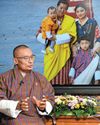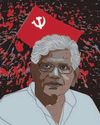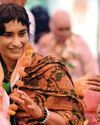An appreciation for regional cuisine has emerged across India, most evidently in restaurants

India does have a national cuisine. I confidently assert this after 20 years of exploring and writing about Indian food. This work has taken me to almost every corner of the country, into all kinds of kitchens from rural to royal. I have had conversations with hundreds of domestic and professional cooks, and enjoyed countless meals.
I am aware of a particular decisive, nationalistic ideal about food that has emerged over recent years. It is not my intention to feed this (pun unintended), rather to defuse it. India’s national cuisine is her regional cuisines, every one of them—from the kalari kulcha of Jammu and the chhena poda of Orissa to the raw fish and wild greens soup called pasa of Arunachal Pradesh and the ker sangri of Rajasthan. They have been developed over thousands of years. Every caste and creed has made a unique contribution to creating a food culture so varied and finely nuanced that it makes up the world’s most diverse cuisine. In my opinion, it is also the most remarkable and complex food culture in the world. Its unparalleled combinations of flavours and textures make it the most exciting to eat.
The first time I came to India I did not come for the food. My only experience of it had been in Indian restaurants outside India, serving dishes from predominantly the northern part of the country, with a ‘chicken vindaloo’ and a ‘Madras prawn curry’ thrown in for good measure. Each of the dishes, all called curry, was almost indistinguishable from the other, made with too much oil and chili. The homogeneity of these offerings suggested to me that this was Indian food—a ‘national cuisine’. What a revelation it was to discover otherwise.
Bu hikaye THE WEEK dergisinin August 11, 2019 sayısından alınmıştır.
Start your 7-day Magzter GOLD free trial to access thousands of curated premium stories, and 9,000+ magazines and newspapers.
Already a subscriber ? Giriş Yap
Bu hikaye THE WEEK dergisinin August 11, 2019 sayısından alınmıştır.
Start your 7-day Magzter GOLD free trial to access thousands of curated premium stories, and 9,000+ magazines and newspapers.
Already a subscriber? Giriş Yap

Themes Of Choice
As Savvy Investors Seek New Avenues, Thematic Mutual Funds Are Gaining Popularity

A golden girl
One of India's most formidable beauties passed away earlier this month. The odd thing is she would absolutely hate this obituary; she hated being written about and avoided publicity for all of her nine decades. Indira Aswani was 93 when she died. But anyone who encountered her, even briefly, was in such awe of her grace and poise, and one could not but remember her forever.

The interest in wine is growing delightfully in India
The renowned British wine writer and television presenter Jancis Robinson, 74, recently came to Delhi and Mumbai to reacquaint herself with India's wine industry. This was the Robinson's fourth visit to India; the last one was seven years ago. On this trip, Robinson and her husband, restaurateur Nicholas Lander, were hosted by the Taj Hotels and Sonal Holland, India's only Master of Wine.

United in the states
Indian-Americans coming together under the Democratic umbrella could get Harris over the line in key battlegrounds

COVER DRIVE
Usage-driven motor insurance policies offer several benefits

GDP as the only measure of progress is illogical
Dasho Karma Ura, one of the world's leading happiness experts, has guided Bhutan's unique gross national happiness (GNH) project. He uses empirical data to show that money cannot buy happiness in all circumstances, rather it is family and health that have the strongest positive effect on happiness. Excerpts from an interview:

India is not a controlling big brother
Prime Minister Tshering Tobgay considers India a benevolent elder sibling as the \"big brotherly attitude\" is happily missing from bilateral ties. He thinks the relationship shared by the two countries has become a model of friendship not just for the region, but for the entire world. \"India's attitude is definitely not of a big brother who is controlling and does not allow the little brother to blossom and grow,\" says Tobgay in an exclusive interview with THE WEEK.

Comrade with no foes
Lal Salaam, Comrade Yechury-you were quite a guy!

Pinning down saffron
In her first political bout, Vinesh Phogat rides on the anti-BJP sentiment across Haryana

MAKE IN MANIPUR
Home-made rockets and weapons from across the border are escalating the conflict